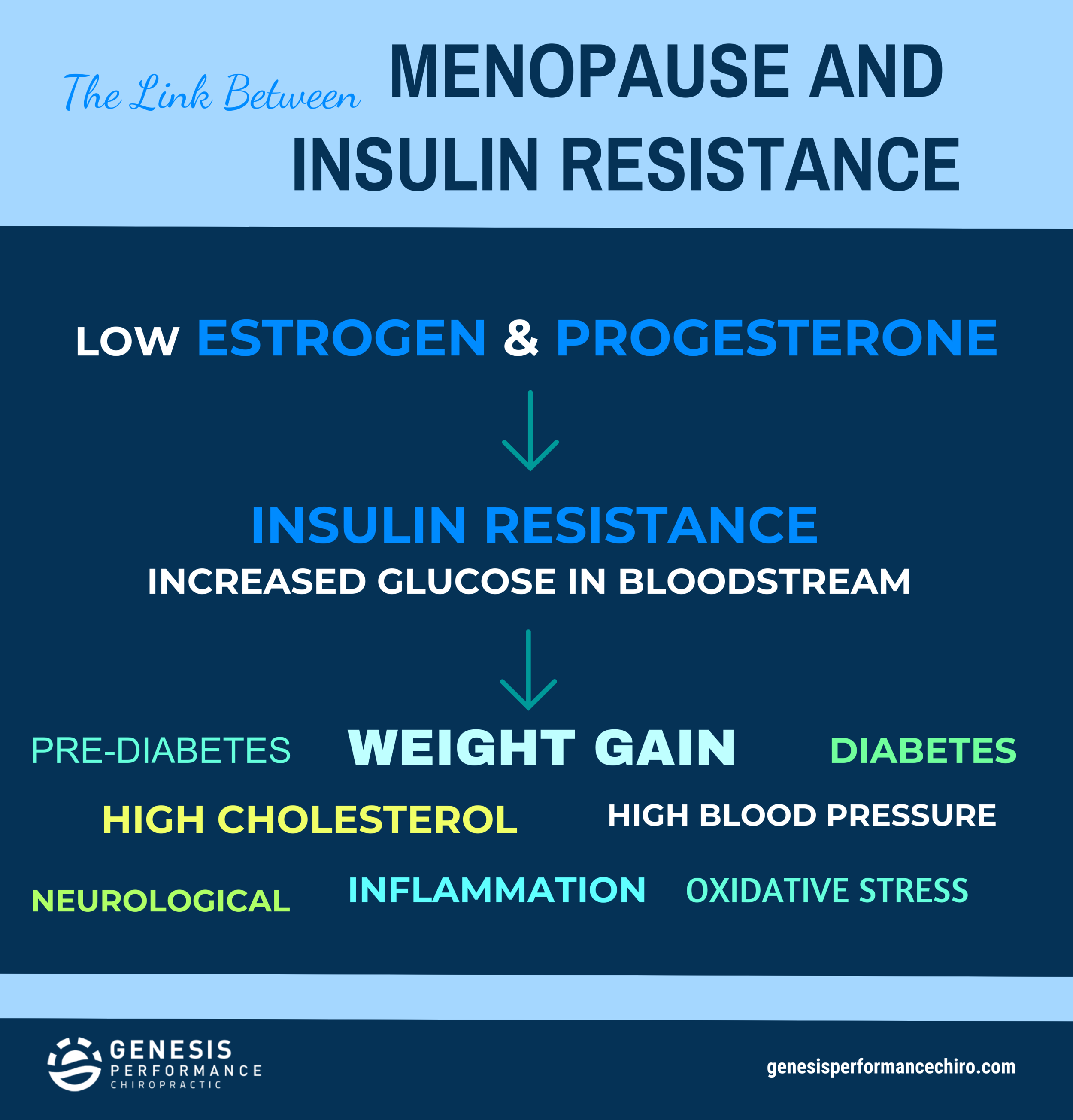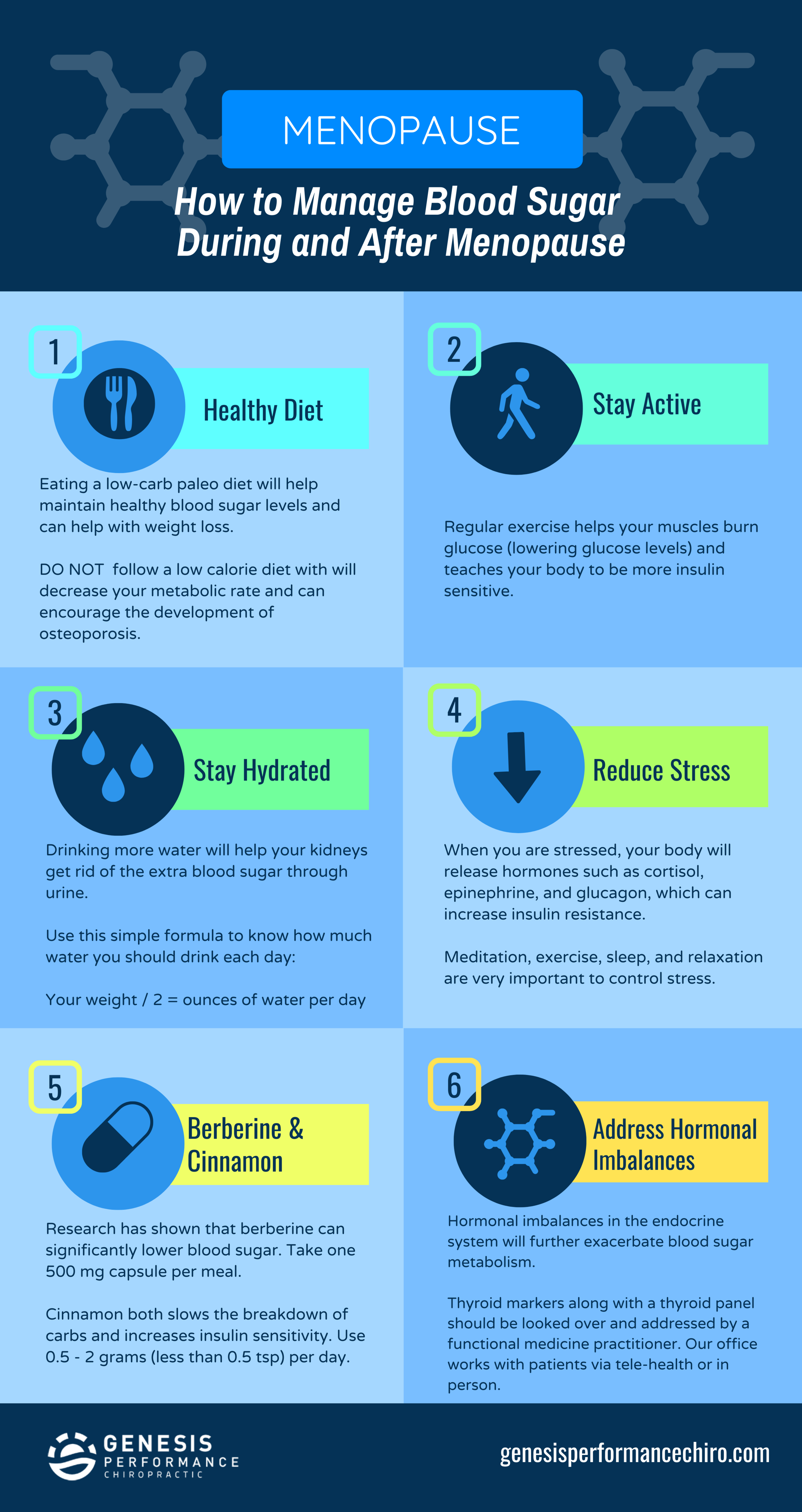Effects of Menopause on Blood Sugar
In this article, I focus on a very important issue for women during and after menopause: blood sugar. Blood sugar, or blood glucose level, is the concentration of glucose found in the blood. Glucose is a very simple carbohydrate, which comes from breads, grains, fruits, dairy products, and some vegetables. While glucose is an important fuel for the body, if the concentration of glucose is too high in the body, it can be very problematic, leading to complications such as diabetes.
Blood sugar can reach problematic levels during and after menopause. Age and other risk factors may be contributing factors to this issue, but there is evidence that hormonal shifts from menopause may play a major role. In our clinic, we see blood sugar issues emerge or become more severe during and after menopause.
So what are these hormonal shifts? If you remember from my first article on menopause, many of the challenges with menopause are due to a decrease in estrogen. Prior to menopause, the ovaries produce most of the estrogen found in the body. After menopause, the ovaries stop producing estrogen. Estrogen instead comes mostly from body fat. The primary form of estrogen found in women prior to menopause is estradiol. Before menopause, normal estradiol levels are anywhere between 30-400 picograms per milliliter (pg/mL). After menopause, it drops to below 30 pg/mL (1).
Progesterone levels also drop after menopause. Pre-menopause, these levels can be around 1.5 nanograms per milliliter (ng/ml). Before ovulation, these levels increase. If a pregnancy occurs, levels will continue to rise during a healthy pregnancy, up to 150 ng/ml. After menopause, these levels will drop to below 0.5 ng/ml (2).
Estrogen & Progesterone Effects on Insulin
Estrogen and progesterone have an effect on the way insulin works in the body. Insulin is a hormone produced in the pancreas, which helps your body use glucose for the energy it needs and then store the remainder.
Estrogen helps to optimize insulin. Typically, premenopausal women have increased insulin sensitivity (meaning their bodies use insulin effectively) over men who are the same age. Compared to these age-matched men, premenopausal women also have reduced incidence of type 2 diabetes. However, after menopause, this advantage disappears due in part to the reduction of estrogen in the body (3). Reduced estrogen levels can lead to insulin resistance, which is when your body does not respond to insulin well and blood sugar increases.
While progesterone’s relationship with insulin is a bit more complicated than estrogen, there is evidence to show that it also can affect insulin sensitivity and that the drop in progesterone after menopause affects blood sugar (4).
Weight Gain and Insulin
The hormonal shifts in menopause also play a big part in where women tend to gain weight. Premenopausal women often gain weight around the thighs and buttocks in the form of subcutaneous fat. But during and after menopause, women tend to gain weight around the abdominal area. This fat is known as visceral fat. This type of fat secretes a protein called retinol-binding protein 4, which is connected with insulin resistance. High amounts of visceral fat can lead to type 2 diabetes (5).
Additionally, if you already have diabetes, you may notice that your blood sugar levels rise and fall more dramatically than before menopause. This can cause more complications with diabetes. If you have diabetes or are prediabetic, it’s extremely important to watch blood sugar levels during and after menopause (6).
Blood Sugar and Sleep Issues
As I noted in my last article, sleep issues are also prevalent during menopause due to hot flashes/night sweats. Unfortunately, sleep deprivation can also cause issues with blood sugar handling. With sleep challenges, the body often produces more cortisol, which is a stress hormone. Cortisol provides the body with glucose by using protein stores through gluconeogenesis in the liver. This is okay for the short term when you need to perform in a stressful situation. But if the body has increased cortisol levels over the long term, it will more consistently produce glucose and increase blood sugar levels (7). This high cortisol can also drive weight gain in the abdominal area.
And to bring it full circle, blood sugar levels can cause issues with sleep. When someone has hyperglycemia (high blood sugar), their kidneys will try to get rid of the sugar by urination, which may mean frequent bathroom trips throughout the night. In this process of excreting the sugar through urination, the body can also take fluids from its tissues, which will make you feel dehydrated. Hence, waking up for a glass of water may interrupt sleep as well.
Sleep issues may also be caused by fasting hypoglycemia (low blood sugar). Fasting hypoglycemia occurs when blood sugar drops because of not eating for a few hours. The person will wake up suddenly from a surge of cortisol, which is produced by the adrenals in order to increase blood glucose levels.
A person may also oscillate between hyperglycemia and hypoglycemia- both affecting sleep. It’s very important to get blood sugar under control with a skilled practitioner to stop the vicious cycle.
Blood Sugar and Post-Meal Slump
It’s also important to note that eating should NOT affect your energy levels. If you are more energetic after meals or if you feel more fatigued after meals, that is a sign of a blood sugar dysregulation. Those who are insulin resistant after meals tend to feel sleepy. This is a sign that some lifestyle changes are needed.
Blood Sugar Complications Linked with Alzheimers
Alzheimer’s has been referred to as type 3 diabetes, as we are finding that blood sugar plays a role in the neurological impairment you find in Alzheimer disease. In one particular study that compared patients with Alzheimer disease to patients who did not have the condition, researchers found that type 2 diabetes was much more prevalent in the group with Alzheimer disease. In fact 81% of the 100 patients with Alzheimer disease either had type 2 diabetes or impaired fasting glucose (IFG) (8). Those who have IFG have blood sugar levels that are below the diagnostic level for diabetes, but above normal levels. They are at significant risk of developing diabetes if no lifestyle changes are made.
Insulin resistance plays a big role in the development of Alzheimer disease. As you know, insulin resistance is a huge component of diabetes and prediabetes. Insulin also plays an incredibly important role in the brain. Insulin regulates cognition and memory, helps with the growth of neurons, helps with synaptic plasticity, prevents apoptosis or cell death, and helps with overall neurotransmission. When the body is unable to use insulin effectively, the brain suffers (9). While Alzheimer disease is a multifactorial illness, insulin resistance is a tremendously large risk factor.
Menopause creates a challenge for managing blood sugar levels due to the hormonal shifts that go along with the transition. If not handled properly, this shift can increase the risk of blood sugar issues, which can then increase risk of developing Alzheimer disease (10).
How to Manage Blood Sugar During and After Menopause
Now that you’ve learned about the complications associated with menopause and high blood sugar, what do you do about it?
Diet and weight
One important thing to focus on is diet. Menopausal and postmenopausal women often do well with a low carbohydrate diet, simply because they are not pumping as much glucose into their bodies in the first place. Additionally, low carbohydrate diets tend to help menopausal and postmenopausal women lose weight, which is increasingly difficult as they get older. Losing weight will also help to regulate blood sugar. In one particular study, menopausal women on a paleo diet had a larger reduction in belly fat and overall weight than women on a low-fat diet after two years (11). In contrast, low calorie diets, though tempting at first, will decrease metabolic rate, making it difficult to keep weight off. They may also increase the risk of osteoporosis.
It’s important to note that diet should be a primary focus for health goals. Nothing replaces a quality, nutrient-dense diet.
“In one particular study, menopausal women on a paleo diet had a larger reduction in belly fat and overall weight than women on a low-fat diet after two years.”
Exercise
It’s also important to stay active. Something as simple as walking 30 minutes a day will help with losing weight and regulating blood sugar. When you exercise, your muscles will burn sugar in your body, helping to lower glucose levels. Additionally, when you exercise on a regular basis, your body will learn to use insulin more efficiently (12).
Staying hydrated
Drinking more water can also help to control blood sugar and reduce the risk for diabetes (13). Drinking more water will help your kidneys get rid of the extra blood sugar through urine. As an added bonus, it also rehydrates the blood. It’s important to note that drinking sugary beverages will do the opposite! To know how much water you should be drinking per day, take your body weight and divide it by 2; this equals the amount of water you should be drinking per day in ounces. For example, a 150 pound person should drink 75 ounces in water per day to stay properly hydrated.
Controlling stress
Controlling stress levels is very important for a variety of health issues, and blood sugar is no exception. When you are stressed, your body will release hormones such as cortisol, epinephrine, and glucagon, which can increase insulin resistance. Meditation, prayers, exercise, sleep, and relaxation are very important to control stress.
Berberine
Taking a berberine supplement can also help to lower blood sugar. Berberine is a chemical that is found in various plants, such as European barberry, Indian barberry, goldenseal, goldthread, Oregon grape, phellodendron, and tree turmeric (14). Research has shown that berberine can significantly lower blood sugar; some research has shown that it may be as effective as some blood sugar lowering drugs, such as metformin (15). Our patients take one 500 mg capsule per meal, totaling 1,500 mg per day.
Cinnamon
Adding cinnamon to your foods is also an easy way to reduce blood sugar. Cinnamon both slows the breakdown of carbs (16) and increases insulin sensitivity (17). You just don’t want to eat too much, as this can cause harm. You should eat no more than 0.5-2 grams (0.4 teaspoons) of cinnamon per day (18).
Address hormonal imbalances
Hormonal imbalances in the endocrine system will further exacerbate blood sugar metabolism. Hypothyroidism will slow down the body’s metabolism allowing glucose to accumulate easier. Increasing DHEA levels for those with low DHEA can significantly decrease visceral (belly) fat and increase insulin sensitivity (19). Every hormone influences the others; that is why doing a hormone panel with a complete thyroid panel is so important. These hormones should not be measured separate from the others.
Controlling blood sugar is so important for health and wellness throughout our lives. I would love to work with you to make a plan that is specifically catered to YOUR needs during this important transition.
Works cited:




